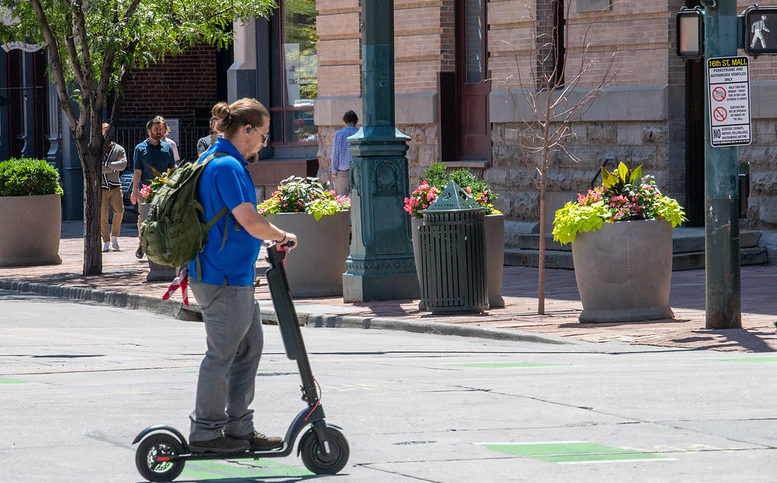
Photo: DRCOGorg (Flickr)
Should cities subsidise shared micromobility services?
23 November 2023
by Christopher Carey
With shared bike and e-scooter schemes becoming a ubiquitous feature of urban mobility, some cities are asking whether a more long-term, collaborative funding model could be worth considering.
Known as ‘micro-subsidies’, the concept essentially involves public entities like city transport departments funding part of the service that private micromobility firms provide in exchange for a wider deployment of shared e-scooters and bikes outside of core city centre areas.
While the idea may seem like a stretch for cash-strapped agencies already suffering from a drop in revenue post-COVID, some see potential benefits, such as increasing access and better connecting people to public transport.

Speaking to Cities Today on the sidelines of the recent Smart City Expo World Congress in Barcelona, Chris de Veer, Mobility Programme Manager at public-private partnership Amsterdam Smart City, said he believed the idea was worth exploring.
“It’s about subsidising the first and last-mile – now you have e-scooters and shared bikes that are privately owned and the operators need to make money,” he said.
“In the Netherlands we subsidise the operations of public transport agencies, so why not do that with shared mobility too?
“The advantage is that it could broaden their whole surface [area], because now they stick to the centre of town. I would like to see them expanded to the suburbs where there is less demand.
“There’s no programme yet, but we are thinking about it.”
Industry call
Perhaps unsurprisingly, micromobility firms are thinking about it too.
Last year, Lyft’s Head of Transit and Micromobility Policy, Caroline Samponaro, said that public subsidies would be “critical” to helping micromobility companies deliver services in more low density areas, which are less profitable.
“For pennies on the dollar, you’re expanding the reach of the transit system and creating a connected network,” said Samponaro.
French firm Dott has taken the concept further, recently completing a pilot study in Brussels that examined the effect reduced price trips had in low income areas. The company said that by implementing targeted micro-subsidies, aimed at specific local communities, cities can accelerate towards their sustainable mobility goals.
Mobility as a Commons
Amsterdam is also looking at the role the sharing economy can play in helping to reduce car use.
In March 2023, the city’s innovation department hosted a working session on the concept of Mobility as a Commons (MaaC) – exploring how residents could share cars instead of renting them from private companies.
Organised through the Horizon 2020 GEMINI project, the municipality is currently working with Smart Innovation Norway, Cenex Nederland and the Townmaking Institute to gather insights on how to facilitate “locally organised mobility”, with a view to creating a community car-sharing service in the city.
The city did not comment on the exact details of the programme or who would be responsible for funding the scheme, but said: “We will not subsidise citizens in any way, so it’s not going to be a municipal funded publicly owned car-sharing scheme.”
Further details of the programme are expected to be revealed in January.
Image: DRCOGorg (Flickr)











